

LETTER FROM JERUSALEM
Winograd report providing grinding
surface for many different political axes
By Ira Sharkansky
 JERUSALEM—This was a big day in Israel. Not because of the snow that landed on Jerusalem, and not because of the Florida primary. JERUSALEM—This was a big day in Israel. Not because of the snow that landed on Jerusalem, and not because of the Florida primary.
It was the day that the Winograd Commission was to issue its final report.
The Winograd Commission was appointed to examine the actions of key politicians and the military in the 2006 war in Lebanon. It came on the scene in response to severe criticism of the IDF's performance in the war, and the perception that Prime Minister Ehud Olmert and Defense Minister Amir Peretz had failed to provide the key decisions for the military to implement.
A month ago the Winograd Commission announced that it would issue its final report today. For the whole month we have been deluged with an increasing intensity of blah blah from commentators, and activists ratcheting up their campaigns.
Prominent are the heads of the political parties not in the government coalition. Leading this cluster is Benyamin Netanyahu, head of Likud, doing well in recent public opinion polls, and not missing an opportunity to blame the prime minister for imperfections in the war and everything else.
There are also organizations of military reservists, who have been claiming since the end of the war that the IDF was not prepared, and not well led, either by its commanding officers or by the governmental officials (i.e., the prime minister and the defense minister) charged with providing policy direction.
Yet another group includes the family members of soldiers who died in the war. They say that loved ones gave their lives in campaigns that were not well conceived or directed, and which accomplished nothing worth their sacrifices.
The full report of the Winograd Commission (i.e., the version available to the public without the secret stuff) is said to be 300 pages in length. It is available in Hebrew and English.
The printed version was made available at 6 PM t, Wednesday, January 30th. From 6:00 to 6:30 the chair of the Commission, retired Supreme Court Justice Eliyahu Winograd, read a summary of the report in a ceremony covered by the three major television channels.
The summary pointed to the failure of the IDF, described as the most powerful army in the Middle East, to deal effectively with the Hizbollah terrorist organization. It cited the military and the civilian leadership for not selecting and pursuing a clear strategy. The summary did not include a clear indictment of the prime minister, or material that would be decisive in the various campaigns to oust him. The distinguished members of the commission deferred the knotty political question to the political process.
By 6:45 we heard from politicians who had found details to strengthen their demands against the prime minister, and listened to representatives of the reservists and the families of those killed who found support for their postures. A retired general who failed during the last electoral campaign to win any Knesset seats for a party based on anti-corruption found in the report enough material to urge the present head of the Labor Party, Ehud Barak, to leave the government and thereby give Olmert a push toward oblivion.
One commentator said that there was enough criticism to keep the prime minister from opening the champagne. Other commentators are reading at speed. We are sure to hear much more over the next days. How long this goes on, and its impact on the prime minister seems likely to depend more on political calculations and maneuvers than the words of the Commission.
Whatever happens, the snow has been pretty. Some three inches produced a cancellation of school, university classes, and bus service. We are expecting more tomorrow, and school classes have been cancelled in anticipation. In the middle of today's storm, I looked out of my window and saw a rainbow at the edge of the snow field. Could it be as significant as that seen by Noah (Genesis 9)? A moment later there was a blast of sunlight on the desert mountains about 5 miles to the east on the way to the Jordan Valley.
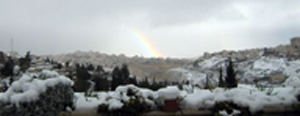 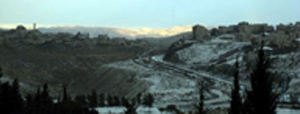
The snow line ends about 300 meters from us. There is seldom precipitation 10 miles further east, in the neighborhood of Jericho. Jerusalem gets about the same average rainfall over the course of a year as London.
All this may be weightier than the Winograd Commission.


JERUSALEM DIARIES
Jerusalem' s snow and political flurries
By Judy Lash Balint
 JERUSALEM—As predicted, heavy, slushy, wet snow fell on Israel’s high ground Wednesday. Jerusalem’s schools closed; courts canceled sessions; buses ran on main streets only and Mayor Uri Lupolianski invited everyone to a snowman contest in one of the city’s main parks in the afternoon. JERUSALEM—As predicted, heavy, slushy, wet snow fell on Israel’s high ground Wednesday. Jerusalem’s schools closed; courts canceled sessions; buses ran on main streets only and Mayor Uri Lupolianski invited everyone to a snowman contest in one of the city’s main parks in the afternoon.
But the main event of the day refused to be overshadowed by the blowing snow. At precisely 6 p.m, a summary of the long-awaited final report of the Winograd Commission was read. The press had y been informed that none of the commission members would answer questions, so at 6:20 p.m. when the reading concluded and the 500 page report was distributed the pundits were out in full force.
The latest telephone surveys showed that the majority of Israelis feel that Prime Minister Olmert has not implemented the lessons of the Second Lebanon War: [No 58%; More or less 8%; Yes 19%; Other answers; 15%]—this, according to the Maagar Mohot Survey Institute presented on Israel Television Channel 10, January 29, 2008.
When the MM Survey asked if Olmert should resign if the Commission report was “severe.’ 19% said no: 73% said Yes: Other replies: 8%.
So, along with the melting snow that promises to derail day-to-day life over the next couple of days, a consequential watershed moment could have been at hand with the release of the Winograd report.



THE JEWISH CITIZEN'A Jewish Story Everywhere'
Imperial Beach blue: 'John' was canceled
By Donald H. Harrison
 IMPERIAL BEACH, California—Television producer David Milch had scored big with the ABC television series NYPD Blue and with the HBO series Deadwood. Each in its own way was trailblazing—NYPD Blue with its staccato camera shots and dialogue; Deadwood with its barrage of authentically foul cowboy language. However, John from Cincinnati proved too trailblazing—even for HBO—and after one season cancellation last year befell the series about a paranormal visitor to Imperial Beach where three generations of surfers formed the colorful but dysfunctional Yost family. IMPERIAL BEACH, California—Television producer David Milch had scored big with the ABC television series NYPD Blue and with the HBO series Deadwood. Each in its own way was trailblazing—NYPD Blue with its staccato camera shots and dialogue; Deadwood with its barrage of authentically foul cowboy language. However, John from Cincinnati proved too trailblazing—even for HBO—and after one season cancellation last year befell the series about a paranormal visitor to Imperial Beach where three generations of surfers formed the colorful but dysfunctional Yost family.
Although the mysterious “John” only manifested himself in Imperial Beach over ten episodes—never having the time to resolve the question of whether he was an alien, or an angel, or perhaps an autistic channel through which the town’s residents could communicate desired miracles to God—the character and the short-lived series of 2007, as well as its Jewish co-creator Milch, all are remembered fondly in Imperial Beach.
The show helped burnish the movie-locale credentials of a town that bills itself as the “most southwesterly city in the continental U.S.” That may sound good, but the fact is the city’s distinctive geography has inhibited its business growth—the Interstate 5 passes well to the east of Imperial Beach, and to approach the city from the north by a coastal route, one must first cross San Diego Bay to Coronado. So whatever he might have been, “John,” and the HBO crew, all were made welcome by the development-hungry and tourist-friendly Imperial Beach Chamber of Commerce.
Milch and his production company paid to use the closed-down El Camino Hotel as one locale, redecorated Imperial Beach Coffee and Book for another locale; transformed a warehouse into “Yost Boards,” where the television family sold surfboards, and made some of the real sights of Imperial Beach and Tijuana more mystifying than they really are.
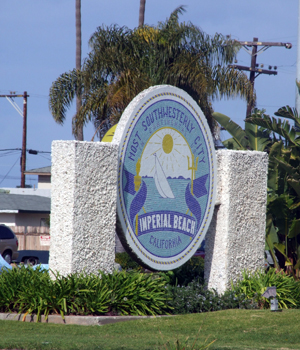 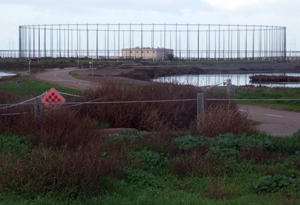

—
For example, in one episode, one of the characters seemed to levitate over the Tijuana Estuary, with the camera angle transforming the Tijuana bull ring far in the background into what might have been interpreted as a space ship. And now and again, the cameras would refocus to the northern boundary of Imperial Beach on a large circular metal structure—which local residents know to be a U.S. Navy radio facility for communicating with ships at sea. But in the world of “John,” it just might have been anything. What actually did look real, and for this, the city of 27,000 residents is truly well-known, was the surfing near the Imperial Beach pier.
Although Imperial Beach has been the locale for other producitons in the past, this was the first in which Imperial Beach didn’t have to pose as somewhere else; for example, as Venice Beach, in the 2005 skateboard movie The Lords of Dogtown. When the Imperial Beach mayor and council learned that the characters in John would include a drugged-out surfer, and an assortment of criminal types, they had to overcome a reluctance born of the understandable fear that instead of rescuing Imperial Beach from obscurity, the series might consign it to notoriety.
Some of the phrases uttered by John in the television series have remained popular among the locals, in particular: “That’s How We Do It in IB” and “Some things I know, some things I don’t.”

Steve Futterman, a member of Imperial Beach’s tiny Jewish community, serves as head of the Imperial Beach International Film Festival, which collects 50 films a year from venues all over the world to show near the ultra-modern Imperial Beach entrance featuring surfboards big enough to tempt King Kong. When he watched John from Cincinnati, he said, “there were three things that stood out. He levitated in the estuary without being drunk; we finally had our own Costco, and we had our police force.”
Stacey Long and Cynthia Melcher, respectively assistant executie and president of the Imperial Beach Chamber of Commerce laughed with Futterman, as some of us sipped a mean Mexican mocha coffee at Imperial Beach Coffee and Book, which now boasts some of the water-related and surfing art works that Milch donated to owner Katy Fallon. She allowed her business for eight filming hours a day to be transformed into something called the Internet Café.
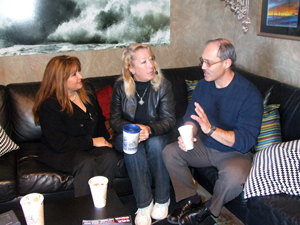 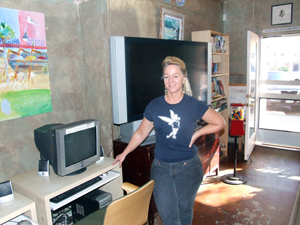
“David Milch was a wonderful man to work with, very intense,” said Fallon. “He was so great—so was everybody. It was a unique experience and I wish it wasn’t over.”
She recalled watching as Milch talked to his actors, telling him what he was hoping to achieve in upcoming scenes. “You could see him, and the intensity, as he got the actors all in the right mood, and frame of mind for the task at hand. Is ‘Butchy’ (Brian Van Holt) intense? Is ‘John’ (Austin Nichols) mellow?... That was interesting to me.”
The crew filmed at her shop on eight separate occasions, typically permitting her to conduct normal business from 6 a.m. to 3 p.m., then shutting down so they could do their filming. “I would get my regular business, plus some,” Fallon said. “So that made my days very good.”
She was not the only merchant who benefitted. Long noted that the crew stayed at the Hawaiian Gardens, a local hotel. Futterman recalled a day the cast and crew ordered 50 pizzas from Seacoast Pizzas. And Melcher said that the City of Imperial Beach collected $78,000 in various fees.
“And they paid to use different properties—like the house on Seventh Street” that served as the home where the elder Yosts raised their grandson, a surfing prodigy whom the drugged-out Butchie was incapable of raising.
Long recalled some requests she received at the Chamber of Commerce offices from Milch. “I got a lot of calls concerning casting,” she said. “He would want me to find, say, ten bald men, or Hispanic women between the ages of 25 and 40.” She would call every Chamber member or business owner she knew to try to find just the right types. “It was quite fun and quite a challenge.”

All the extras also were paid—and given that in one episode there was a parade—that meant at least 300 Imperial Beach residents who brushed with celebrity.
During the time that the series aired last year on Sunday evenings, “people’s lives revolved around being home at night to see it,” Long said. Then on Mondays people would head over to Imperial Beach Coffee and Books to dissect the episode.
Some of them still haven’t figured out for sure what it was all about. “It was a very unique series; you had to be very open minded because it was hard to follow,” said Fallon. “That was why (people videotaped the episodes) and watched each one three or four times.”
On one thing Imperial Beach residents seemed to agree: Milch and the crew were “so gracious and respectful to Imperial Beach, knowing that this is our home, our back yard,” Long said. “They didn’t come to intrude, or be bossy, or rude; they were just down to earth, sweet people.”
“I miss them terribly,” said Fallon.


The labels that other people affix to us
By Peter Garas
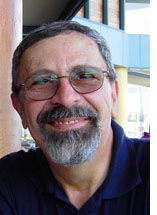 CANBERRA, Australia--Our editor, Don Harrison. recently wrote a very moving story about the "San Diego Incident" and the reaction of those present at the talk he recently gave about this incident. CANBERRA, Australia--Our editor, Don Harrison. recently wrote a very moving story about the "San Diego Incident" and the reaction of those present at the talk he recently gave about this incident.
When I read the response of one of the members of his audience—"The Jews of Mexico are Jews first, Mexicans second, “ she said. That is the way the society treated them and the way they thought of themselves— I immediately identified with the remark and it brought back some memories of my own.
I guess there is some truth to the notion that we are who we are labeled as being, until we are confronted with having to make a choice among the options and finally deciding whether to accept the labels that are applied to us or to label ourselves!
Way back in 1957 when my parents and I arrived in Australia with no possessions of our own and wearing clothes provided for us by International refugee organisations, my experience of who I was, was largely determined by the way in which I was labeled by others. When we boarded the ship which eventually brought us to Australia from Europe, I can recall the little tag which was attached to one of the buttons on the checked jacket that I was wearing. The tag identified and classified me as a Hungarian Jewish Refugee.
The way I was treated at the first primary school that I attended in Sydney also helped to reinforce that identification.
I guess that children will always tease a newcomer and I was no exception. With my total lack of English, the funny clothing I was wearing, the 'foreign muck' my mother packed as my lunch and my total bewilderment at what was truly a novel experience, made me a prime target on those first days at school. In the playground in the mornings and at lunch time I was teased mercilessly.
I had no idea what was being said to me - but I surely did understand the tone and the intent of whatever it was and so responded accordingly.
These days, I know that my response at the time was in line with what is referred to as the "flight or fight response." Back then, all I knew was that I had two choices, I could either cut and run or I could stand and fight!
Never did like running so I chose to fight.
When the young boy who was the apparent leader of the group of children who were teasing me was lying in a corner bleeding, with the other children screaming and calling for help from the teachers who, aghast, were trying to do what they could to restore order, all I felt was a moment of satisfaction and relief followed immediately by an overwhelming fear of the consequences of what I had done. I knew instinctively that I had now added at least one more label to my "Hungarian Jewish Refugee " tag. What this was going to be was moot.
I could end up being labeled a "bully," "aggressive," "uncontrollable," "violent" or something else!
I have no idea what the school added to the label or what the teachers added to my label, but I am sure that there is a record of this somewhere in the files.
All I know is that those children who had teased me and picked on me did not do that any more. So they probably added a "do not annoy" tag to my name.
As time passed I finally found out what they had been chanting and laughing about. They had been making fun of the new kid and taunting me by calling me a "Hungarian Jewish Refugee,” but using terms which in the slang of the era were considered derogatory.
Regardless of anything else about this incident, it clarified for me my place in the society of the school and the labels I was allocated to wear by those who lived around me. I was a "Hungarian Jewish Refugee" in that order and a Hungarian Jewish Refugee who would stand no nonsense from anyone!
Time passed and eventually I was in a position to take my first trip overseas. It included a trip back to Hungary to finally meet relatives that I had heard about, but could not recall ever meeting. Suffice it to say that when I met them, even though my Hungarian was at worst passable, it being my first language, it was of course by this time heavily accented by "Strine," the Australian English that I had been exposed to through most of my life.
Apparently I spoke English and Hungarian with an Australian accent.
So my relatives, while seemingly pleased to see me again, (or meeting me for the first time) tended to tease me about my pro western Australian outlook and my Hungarian speech which they thought was "quaint" and so different from the Eastern European mentality that was prevalent in the East -Bloc of that time.
The fact that I was from a Jewish background was an issue only for those relatives who had abandoned their heritage and adopted either an agnostic or socialist ideology.
Amazing!
Here I was thinking for all those years that I was a Hungarian Jewish Refugee who happened to find shelter in Australia and now back in the country of my birth I was once again an alien - an Australian and for some an even more interesting creature - an Australian who identified himself as a Hungarian Jew and did NOT even understand how pro-western and anti communist his ideas and ideology had become.
Up to this point I had not actually thought of myself as Australian nor about my attitudes as being pro-western.
When I first visited Israel no one mentioned the fact that I was a Jew!
In the circles in which I travelled I was thought of as an Australian from a Hungarian background and the fact that I was Jewish was taken for granted - after all I was in the land of the Jews!
Amazing! Here my Jewishness was not part of my label, my being a refugee was not part of the label. In Israel, I was an Australian tourist who happened to speak Hungarian. A tourist moreover who was welcome while I had money to spend and kept out of mischief. I was indulged as an acquaintance, but could never become part and parcel of the culture as I was not making Aliyah!
It's many years since then and I now realise that there were many more labels that I carried with me from time to time, sometimes in the complete bliss of ignorance. Labels relating to my gender, my profession, my marital status, my competence (you pick the subject matter) and so on.
So I guess we are who we are defined by others as being.
I know that editor Harrison describes me as “a freelance writer and commentator in Australia's capital city."
So who am I really?
Probably I am to each other person what they label me as being - to myself, I am a sub-set of those labels and perhaps a few that they do not ascribe to me.
All I know is that in life I try to follow the instructions of the Bard who said; "To thy own self be true!"


How to order flowers for a bat mitzvah
By Sheila Orysiek
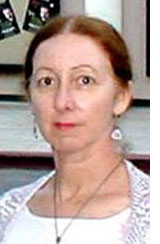 SAN DIEGO—A phone rings: Ring -a-ling…… SAN DIEGO—A phone rings: Ring -a-ling……
Hello - First Avenue Florist Shop - can I help you?
Hello, I’m here in San Diego but I would like to order a really nice flower arrangement for a Bat Mitzvah in a synagogue in Philadelphia - can you do that for me?
Yes, - we are members of the FTD - we have outlets across the country.
I don’t know the exact address of the synagogue but it’s a big one on Roosevelt Blvd. Do I need to get you the exact address?
No, our florist in Philly will know - they’ll check out the synagogue as long as you give me the family’s name.
Oh good. Okay.
What would you like?
I’d like something very fresh and colorful - it’s for a girl - a Bat Mitzvah is kinda like a confirmation…
Yes, I know what it is - we do flowers for these events all the time. Well, since it’s April - how about an arrangement of spring flowers?
Sounds good.
Or would you like flowers in pots - that way they can take them home afterward and have something more permanent? Like a pot of daffodils?
No - I think a big spray arrangement of cut flowers is better.
Okay.
I’d like it delivered on Friday afternoon - tomorrow - so it’s there for Friday evening Sabbath services and then it’ll still be there for the Bat Mitzvah on Saturday.
Okay….sure….
It’s not too late - since it is for tomorrow?
No, problem….we’ve just changed over to daylight savings time…so we make adjustments for that.
What do you have for around $100.00?
I can give you something really nice for that price - plus, of course the cross country fee - and a fee for delivery. It comes to $150.00.
Okay - here’s the info for my credit card….you do take credit card don’t you?
Okay - I got it - all the information I need…..anything else?
No - that should do it - thanks a lot.
Thank you!
(About two hours later)
Ring-a-ling…
Hello. How can I help you?
Hello - I was speaking to you earlier - I placed an order for a Bat Mitzvah.
Oh - yes, I remember.
Well, some things I forgot to mention - or make sure I made clear.
Okay.
Did you get the order going already - did the delivery people get the address of the synagogue?
Yes, - they have all they need.
I want to make sure that it will still be fresh from one day to the next; the synagogue doesn’t accept deliveries on Saturdays. I assume the synagogue has a large enough refrigerator to keep it fresh overnight.
Yes, of course - to keep everything looking good and fresh - it has to be refrigerated - but the synagogue will do that - they know to do that. All these places …..churches, synagogues, have large enough refrigerators.
Okay. There is a time difference - and since I said Friday afternoon - the delivery needs to take into account the time difference.
Yes, we realize that - we’ve changed our clocks for daylight savings time.
I also want to be sure it won’t be in pots - I want it to look like a spray or a circle. That it will be fresh cut.
It will be fresh cut - only the best looking. We don’t do things in pots very much. It’ll be an attractive arrangement.
I want it to be bright and colorful.
Yes, we’ll see to it that everything has a good bright color - arranged in contrasting colors. There will be colorful mats underneath.
Well, that’s a good idea, keeps it all neat if something should spill over. Some greenery too….
Oh yes, we put greenery not only around the edges, but in the center - we mix it in. Sprigs of cinnamon fern, some mint, ….things like that. We cut things in different sizes and shapes to make it all look interesting and beautiful at the same time.
I’ve never heard of using mint in such arrangements - but that sounds like a good idea.
Yes, we make it so that everything is edible.
Edible?
Well, that’s the basic idea…..
Edible flowers?
Flowers?
Is this is the florist?
Uh..…this is Sid’s Deli……..
(The above is a true story - happened to me - I couldn’t make this up. Sid and I spent a long time laughing.)
SAN DIEGO JEWISH WORLD THE WEEK IN REVIEW
Francine Ginsburg in La Jolla, California: Storyline, editing, teaching potential are all criteria for whether a film is chosen
Donald H. Harrison in National City, California: When civic and religious duties clash
Marissa Palin in La Jolla, California: Global warmth: is Bible really to blame?
Reut Schwartz-Hebron in San Diego: Economics account for some Hindu and Jewish ritual; Zen offers a way to adapt
Shoshana Bryen in Washington D.C.: Gaza chaos likely to metastasize, posing new dangers to Israel, U.S. forces, Egypt (A report by Lenny Ben-David)
Cynthia Citron in Los Angeles: Last Days of Judas Iscariot lasts and lasts
Carol Davis in San Diego: Ion scores with The Pillowman
Peter Garas in Canberra, Australia: Tired of telephone solicitors? Try handling them with some old fashioned chutzpah
Donald H. Harrison in La Jolla, California: Ethiopian Jew's show a comical eye-opener
J. Zel Lurie in Delray Beach, Florida: Should Allies have bombed Auschwitz?
Shoshana Bryen in Washington, DC: Should Gaza be made a U.N. protectorate?
Peter Garas in Canberra, Australia: Palestinians should consider emigrating to lands where there are real opportunities
Norman Greene in San Diego: England is the most anti-Semitic country in Europe, Dershowitz tells news media
Donald H. Harrison in San Diego: JFS programs, including youth-run food pantry, flourish at Turk Family Center
Rabbi Baruch Lederman in San Diego: When questions of halacha are posed to embarrass rather than to learn
Rabbi Leonard Rosenthal in San Diego: Taking our mother's Hebrew name too
Shoshana Bryen in Washington, DC: Why Gaza finds itself in the mess it's in
Donald H. Harrison in Poway, California: JFS North County Inland Senior Center is a place for physical and mental exercise
Sheila Orysiek in San Diego: Sabbath Amphitheatre: Celebrating Creation in Sequoia National Park
< BACK TO TOP
|

